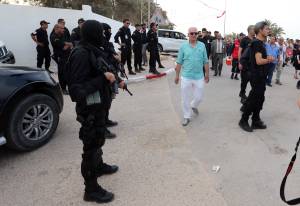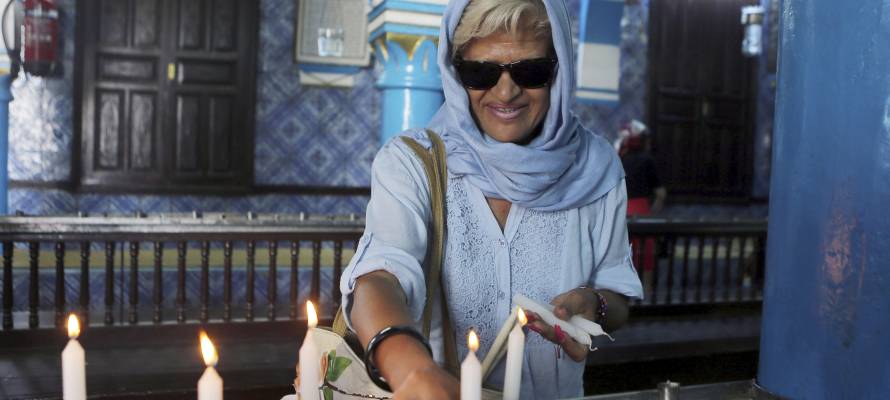Hundreds of Jews are making a pilgrimage to the ancient Tunisian synagogue of El Ghriba on the island of Djerba, despite warnings of a possible terror attack against Jewish targets.
Tunisia says it has increased security for the Jewish pilgrimage to the age-old Ghriba synagogue after the Bardo Museum attack in Tunis that left 22 people dead, mostly foreign tourists.
Tour operators estimate that around 500 foreign visitors — including people from France, Israel, Italy, Britain and the U.S. — will participate in the pilgrimage to Africa’s oldest synagogue on Djerba island on Wednesday and Thursday.

Tunisian police officers stand guard near the entrance of the Ghriba synagogue in the resort of Djerba, south Tunisia. (AP/Mohsen May)
Police and military presence has been increased and roadblocks have been installed at all entrances to the city and around its hotels.
Tour operator Rene Trabelsi says tourist numbers are lower than normal, as some visitors may have changed their minds after the deadly March 18 attack on the national Bardo Museum.
“There is a lot of security, there are soldiers and police everywhere and that is very reassuring to us,” French-Jewish tourist Lorine Bendayan said.
Israeli Prime Minister Benjamin Netanyahu said on Saturday that Israel has received “concrete threats” of terror attacks against Jewish and Israeli targets in Tunisia.
In the past year, North Africa has become a hotbed for Islamic extremism, with the al-Qaeda and Islamic State terror groups both active in neighboring Libya, where they have murdered dozens of Christians.
On Sunday, Tunisian Interior Minister Mohamed Nahem Gharsalli visited Djerba with other Tunisian senior security officials to assess the preparations for the pilgrimage, promising that the Tunisian government will protect the Jewish population.
“My visit is part of monitoring the latest preparations ahead of the pilgrimage to El Ghriba and the mobilisation of security and military forces and the civil protection and Navy to ensure the success of festivities,” said Gharsalli, AllAfrica.com reported.
Gharsalli added, “Tunisia is able to protect Jews and all its guests better than any other country.”
By: Bouazza Ben Bouazza, AP, JNS.org and United with Israel Staff
